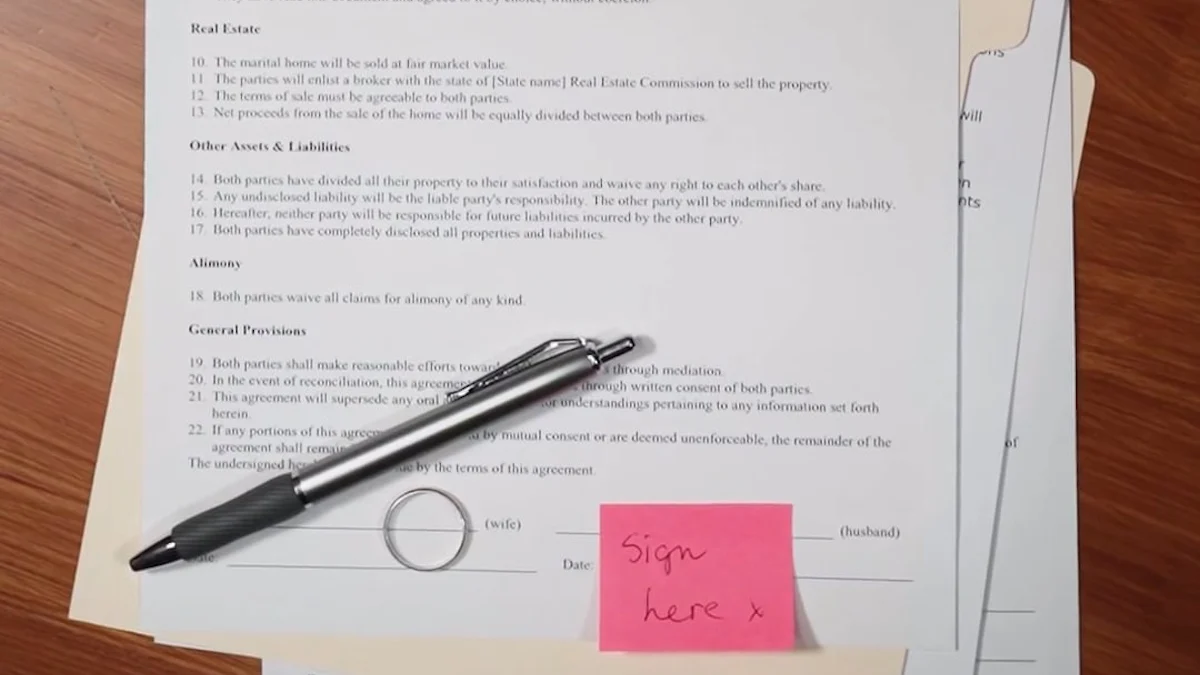Understanding the Texas Divorce Process and Overcoming Obstacles

Going through a divorce can feel like an emotional rollercoaster. You might experience sadness, anger, or even guilt. These emotions can cloud your judgment and impact your health. If you're navigating a Texas divorce, the unique legal requirements can add another layer of stress. It’s easy to feel overwhelmed, but you’re not alone. Understanding the process and addressing these challenges head-on can help you regain control. Remember, taking small, thoughtful steps can make a big difference during this difficult time.
The Texas Divorce Process

Legal Requirements
Residency requirements
Before you can file for divorce in Texas, you need to meet specific residency requirements. These rules ensure that the state has jurisdiction over your case. Here’s what you need to know:
At least one spouse must have lived in Texas for at least six months before filing.
The spouse filing for divorce must have resided in the county where they’re filing for at least 90 days.
If you don’t meet these requirements yet, you’ll need to wait until you do. It’s a small but crucial step in the divorce process.
Grounds for divorce
Texas allows both fault and no-fault grounds for divorce. No-fault divorces are the most common and are based on "insupportability," meaning the marriage can’t continue due to conflicts. Fault-based grounds include:
Adultery
Cruelty
Abandonment
Felony conviction
Living apart
Confinement in a mental institution
Understanding these grounds can help you decide how to proceed with your case.
Key Steps
Filing the petition
The divorce process begins when you file a petition with the court. This document outlines your request to end the marriage and includes details like property division and child custody.
Serving the other party
Once you file, you must serve your spouse with the divorce papers. This step ensures they’re officially notified and have a chance to respond.
Temporary orders and waiting period
During the process, the court may issue temporary orders to address immediate concerns like child custody, spousal support, or property use. Texas also requires a 60-day waiting period before finalizing any divorce.
Finalizing the divorce
After resolving all issues, the court will issue a final decree. This document legally ends your marriage and outlines the terms of your divorce.
Types of Divorce
Uncontested divorce
An uncontested divorce happens when both spouses agree on all terms, including property division and custody. These cases are quicker and less expensive, often finalized within 60 to 90 days after the waiting period.
Contested divorce
A contested divorce occurs when spouses can’t agree on key issues. These cases take longer, usually between 4 to 12 months, and involve more legal fees. They can also be emotionally taxing due to the higher level of conflict.
Understanding these types can help you decide the best path forward. Whether you’re pursuing an uncontested or contested divorce, consulting a divorce attorney can make the process smoother.
Challenges in a Texas Divorce

Property Division
Community property laws
In Texas, property division can be one of the most challenging aspects of a divorce case. Texas follows community property laws, meaning any property acquired during the marriage is considered jointly owned by both spouses. This includes income, real estate, and even debts. However, exceptions exist for gifts, inheritances, or property owned before the marriage. Disputes often arise when deciding how to divide these assets fairly, especially in high-stakes cases involving significant financial holdings.
Resolving disputes over assets
Disagreements over property division can add stress to an already difficult process. To resolve these disputes, you can take several steps:
Hire professionals to appraise valuable items like homes or businesses.
Work closely with a divorce attorney to navigate the legal complexities.
If you have a prenuptial or postnuptial agreement, it can simplify the process by outlining how assets should be divided. Open communication and transparency about financial matters can also help you and your spouse reach a fair resolution.
Custody and Parenting
Best interests of the child
Child custody is another critical issue in a Texas divorce. Courts prioritize the best interests of the child when making custody decisions. Factors like the child’s desires, emotional needs, and the stability of each parent’s home play a significant role. Here’s a breakdown of what courts consider:
Factor | Description |
|---|---|
Child's Desires | The court considers what the child wants, if age-appropriate. |
Physical and Emotional Needs | The current and future needs of the child are paramount. |
Emotional and Physical Danger | Any potential danger to the child is assessed. |
Parental Ability | The capability of the parent to meet the child's developmental needs. |
Available Programs | Programs that assist the parent and child are considered. |
Plans for the Child | The parent's plans for the child's future are reviewed. |
Stability of Home | The stability of the proposed living situation is examined. |
Parent-Child Relationship | Any issues in the existing relationship are taken into account. |
Excuses for Parent's Actions | The court considers any justifications for the parent's behavior. |
Joint vs. sole custody
Texas courts often favor joint custody arrangements, where both parents share responsibilities. However, sole custody may be granted if one parent is deemed unfit. Joint custody requires effective communication and cooperation, which can be challenging during a contentious divorce. Always focus on what’s best for your child, even if it means compromising on certain issues.
Financial Considerations
Spousal support (alimony)
Spousal support can be a contentious topic in a divorce case. In Texas, eligibility depends on specific criteria, such as the length of the marriage or whether one spouse has a disability. Here’s a quick look at the requirements:
Criteria | Description |
|---|---|
Sufficient Property | The spouse must lack sufficient property to meet minimum reasonable needs. |
Scenario 1 | The paying spouse has been convicted of family violence during the marriage. |
Scenario 2 | The spouse cannot earn sufficient income due to disability or other factors. |
If you’re eligible, spousal support can provide financial stability as you transition to life after divorce.
Managing shared debts
Dividing debts can be just as complicated as dividing assets. Joint debts, like mortgages or credit cards, can negatively impact your credit score if not handled properly. To manage shared debts effectively:
Identify which debts are community versus separate.
Work with a divorce attorney to ensure debts are divided fairly.
Communicate openly with your spouse to avoid misunderstandings.
Navigating these financial challenges requires careful planning and professional guidance. Taking proactive steps can help you protect your financial future.
Emotional and Practical Struggles
Coping with stress
Divorce can take a toll on your emotional and physical well-being. It’s normal to feel overwhelmed, but finding ways to manage stress can make a big difference. Start by recognizing your feelings. Allow yourself to process emotions like sadness or anger instead of bottling them up. Building a support system is also crucial. Surround yourself with friends, family, or even a support group that understands what you’re going through.
If the stress feels unmanageable, don’t hesitate to seek professional help. A therapist can provide tools to navigate this challenging time. You can also focus on activities that bring you joy. Whether it’s reading, gardening, or trying a new hobby, these moments of happiness can help you recharge.
Taking care of your body is just as important. Healthy eating boosts your energy and immune system, while regular exercise releases endorphins that improve your mood. Even a short walk can help clear your mind. Aim for 7-8 hours of sleep each night to maintain balance. Meditation or deep breathing exercises can also calm racing thoughts and help you reflect. Remember, small steps toward self-care can lead to big improvements in how you feel.
Maintaining effective communication
Communication during a divorce can be tricky, especially when emotions run high. Feelings like anger or fear often complicate conversations. It’s helpful to remember that your spouse may be experiencing similar emotions. Timing also matters. Avoid discussing sensitive topics in front of children or during stressful moments like work hours.
If direct communication feels too difficult, consider using written methods. Writing things down can provide clarity and reduce misunderstandings. The BIFF method—keeping messages brief, informative, friendly, and firm—can help you stay professional. When conflicts arise, involving a neutral third party like a mediator can make discussions more productive.
Setting boundaries is another key to effective communication. Use “I” statements to express your feelings without escalating conflict. For example, say, “I feel concerned about this decision,” instead of assigning blame. Always keep in mind that anything you say or write could be used in court, so stay respectful and professional. By focusing on clear and mindful communication, you can reduce tension and work toward solutions that benefit everyone involved.
Dos and Don’ts During the Divorce Process

Actions to Take
Organize financial documents
Getting your finances in order is one of the most important steps in divorce planning. You’ll need to organize divorce paperwork to ensure transparency and avoid delays. Start by gathering these essential documents:
Tax returns from the past five years
Proof of income, like W-2 or 1099 forms
Bank account statements
Investment account statements
Real estate and mortgage records
Vehicle titles
Recent pay stubs for both spouses
Business records, if applicable
Health insurance policies
A list of personal property
Having these documents ready will make it easier to work with your divorce attorney and ensure a smoother process. Staying organized can also help you feel more in control during this challenging time.
Focus on children’s well-being
Divorce can be tough on kids, but there are ways to help them cope. Keep a structured routine to reduce anxiety and maintain stability. Model calm behavior to reassure them that everything will be okay. Encourage open communication and let them express their feelings. Remind them that the divorce isn’t their fault. Avoid speaking negatively about your spouse in front of them, as this can strain their relationship with the other parent. If needed, seek support from school counselors or therapists to help your children navigate this transition.
Seek professional support
Divorce is overwhelming, but you don’t have to go through it alone. A divorce attorney can guide you through the legal process and protect your rights. Therapists or counselors can help you manage the emotional toll. Financial advisors can assist with planning for your future. Surrounding yourself with the right professionals ensures you’re making informed decisions every step of the way.
Mistakes to Avoid
Acting out of anger
It’s natural to feel angry during a divorce, but acting on those emotions can backfire. Anger clouds your judgment, making it harder to negotiate or think logically. Losing your temper in court can hurt your case, especially if custody is involved. Vindictive actions, like trying to “win” at all costs, often lead to higher attorney fees and prolonged disputes. Instead, focus on staying calm and making decisions that benefit your future.
Ignoring legal obligations
Failing to meet your legal responsibilities can have serious consequences. Missing support payments or violating custody agreements can lead to contempt of court charges. Unresolved issues, like property transfers, can prolong the process and create financial instability. Always stay on top of your obligations to avoid unnecessary complications.
Making uninformed financial decisions
Divorce can have a lasting impact on your finances, so it’s crucial to plan carefully. Rushing through the process or failing to understand your financial situation can lead to costly mistakes. Take the time to organize divorce paperwork, consult with a financial advisor, and think long-term about your needs. Avoid impulsive decisions and ensure you’re setting yourself up for a stable future.
By focusing on these dos and avoiding common pitfalls, you can navigate your Texas divorce with greater confidence and clarity.
The Role of Attorneys in a Texas Divorce

How Attorneys Assist
Explaining legal rights
Divorce can feel like navigating a maze, especially when you're unsure of your rights. A divorce attorney helps you understand the legal landscape, ensuring you know what you're entitled to under Texas family law. They’ll explain how community property laws affect asset division or what factors influence child custody decisions. This clarity empowers you to make informed choices throughout the process.
Representing in court or negotiations
Whether you're negotiating a settlement or presenting your case in court, having legal representation can make a world of difference. Attorneys bring professional guidance and a wealth of experience to the table. They’ll advocate for your best interests, whether it’s securing a fair property division or protecting your parental rights. Here’s how they can help:
Provide support and expertise during emotionally charged situations.
Use their legal knowledge to strengthen your case in court.
With an attorney by your side, you’ll feel more confident tackling the challenges of divorce.
When to Hire an Attorney
Complex property or custody cases
Some divorce cases are more complicated than others. If you’re dealing with high-value assets, like businesses or investments, you’ll need an attorney to ensure everything is valued and divided correctly. Custody disputes can also get tricky. An attorney will fight to protect your rights while keeping your child’s best interests front and center.
If your spouse has legal representation
If your spouse has hired an attorney, you should too. Facing a legal professional without your own representation puts you at a disadvantage. An attorney levels the playing field, ensuring your voice is heard and your rights are protected.
Alternatives to Litigation
Mediation
Mediation offers a less stressful way to resolve divorce issues. Instead of battling it out in court, you and your spouse work with a neutral mediator to reach an agreement. This approach has several benefits:
Reduce Conflict: Mediation encourages cooperation, making it easier to find common ground.
Preserve Relationships: It fosters respect, which is especially important if you’ll co-parent after the divorce.
Keep Confidentiality: Unlike court proceedings, mediation keeps your personal matters private.
Save Time and Money: Mediation is faster and more affordable than traditional litigation.
If you’re looking for a smoother, more amicable process, mediation might be the right choice.
Collaborative divorce
Collaborative divorce takes mediation a step further. Both parties, along with their attorneys, commit to resolving issues without going to court. This process emphasizes open communication and mutual respect. Unlike traditional litigation, where a judge makes the final call, you and your spouse maintain control over the outcome. Collaborative divorce can save time, reduce stress, and help you avoid the adversarial nature of court battles.
By understanding your options and seeking the right support, you can navigate your Texas divorce with greater ease and confidence.
The Texas divorce process may feel overwhelming, but breaking it down into manageable steps can make it easier. When you stay informed and seek professional guidance, you’ll feel more confident about your decisions. Don’t forget to prioritize your emotional well-being. Taking care of yourself helps you handle challenges better and focus on what truly matters. Every divorce is unique, so take proactive steps that align with your situation. With the right mindset and preparation, you can navigate this transition and move forward toward a brighter future.
FAQ
What is child support, and how does it work in Texas?
Child support is a financial obligation one parent pays to the other to help cover a child’s needs. In Texas, the court calculates it based on the paying parent’s income and the number of children. Payments usually cover essentials like food, housing, and education.
How is child support calculated in Texas?
Texas uses a percentage of the paying parent’s net income to determine child support. For one child, it’s 20%. For two, it’s 25%. The percentage increases with more children. The court ensures the amount meets the child’s needs while considering the parent’s financial situation.
Can child support orders be modified?
Yes, you can request a modification if circumstances change. For example, if your income decreases or your child’s needs increase, the court may adjust the amount. You’ll need to file a petition and provide evidence to support your request.
What happens if child support isn’t paid?
Non-payment of child support can lead to serious consequences. The court may enforce penalties like wage garnishment, license suspension, or even jail time. If you’re struggling to pay, contact the court to discuss your options before falling behind.
Does child support cover medical expenses?
Yes, child support often includes medical expenses. Texas courts usually require the paying parent to provide health insurance or contribute to medical costs. This ensures the child has access to necessary healthcare without financial strain on the custodial parent.
See Also
Streamlining Your Uncontested Divorce With Insupportability In Texas
Dealing With Financial Misconduct In Texas Divorce Cases
A Step-By-Step Guide To Initiating Divorce In Texas
Grasping Insupportability Within Texas Divorce Legal Processes
Subscribe to get the updates!
Sign up now to receive timely blog updates.
I accept the email subscription terms.

